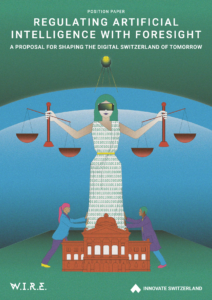Press release

Foresighted Regulation of Artificial Intelligence: Innovate Switzerland Identifies Eight Key Areas for Shaping Switzerland’s Digital Future
- There is an international consensus on the necessity of regulatory frameworks and global agreements to responsibly harness the benefits of artificial intelligence (AI).
- Switzerland is well positioned to play a globally relevant role in developing and testing AI as a new basic technology. To achieve this, Switzerland should adhere to its technology-neutral and principle-based regulation to actively promote research, development, and innovation.
- The Innovate Switzerland community has identified eight priorities to create a safe and trustworthy framework for working with AI, including targeted adjustments to existing laws, consistent knowledge-building, and the promotion of ESG-compatible AI in Switzerland.
Zurich, 16 May 2024 – The launch of ChatGPT as the first open-access application based on generative artificial intelligence has developed into a new era – a “Sputnik moment” with global implications for business, science and society. The rapid proliferation of generative AI has already opened numerous applications within less than two years, raising questions about result quality, training data usage, and adherence to ethical standards.
In this context, there is an international consensus that regulatory frameworks and global agreements are necessary to align the benefits of this new basic technology with responsible management. For instance, the EU has passed the “AI Act,” the world’s first comprehensive AI law, establishing the legal framework and requirements for AI systems.
Switzerland is addressing this topic through its involvement in the Council of Europe and the Federal Council’s mandate to the Federal Department of the Environment, Transport, Energy and Communications (DETEC) to draw up an overview of possible regulatory approaches. As a successful economic, financial, and research centre, as well as a host country for many international organisations, Switzerland is well positioned to play a globally relevant role in the development and testing of AI in this new era.
For this purpose, the Innovate Switzerland community has developed a holistic proposal for shaping the digital Switzerland of tomorrow. Based on analyses and reports from experts in public and private organisations, two key points have emerged for Swiss AI regulation:
- Utilise and selectively supplement existing laws: Switzerland already has a solid legal foundation that is largely adequate for the application of AI. However, it is important to selectively adapt and supplement existing laws to address the potential challenges of the new basic technology. Horizontal AI regulations should be avoided.
- Maintain technological neutrality and principle-based regulation: Swiss regulation should remain technology-neutral and focus on general principles and goals rather than specific rules for individual use cases. This ensures flexibility and enables effective regulation for future generations of technology.
The proposals from Innovate Switzerland receive support from academia and industry:
“The Innovate Switzerland position paper highlights the essential issues and rightly advocates for an independent, technology-neutral Swiss approach that primarily relies on the application and selective adaptation of Swiss law,” says Prof. Dr. Florent Thouvenin, Chair of Information and Communication Law at the University of Zurich. Matthias Brändle, Head of Data Strategy & Analytics Nearshore at Mobiliar, adds: “In the noteworthy position paper by Innovate Switzerland, I particularly appreciate the concise synthesis of different aspects in favour of a pragmatic and consistent AI regulation.”
Based on the fundamental considerations, the Innovate Switzerland community has identified eight priorities for legislators, academia, and society to create a safe and trustworthy framework for working with AI:
- Pragmatic adjustment of national regulation considering international developments: Switzerland should review and adjust its laws based on AI risk dimensions to prevent misuse and promote innovation.
- Building knowledge and decision-making capability: Decision-makers and the general public must have well-founded knowledge of AI to create the right framework conditions for its use.
- Confident protection of critical infrastructures: Switzerland must – in coordination with international standards – establish and implement security measures for AI use in critical infrastructures to ensure resilience.
- Aligning organisational governance with transparency and responsibility: Organisations should develop and implement self-declarations along the entire technology architecture when using AI.
- Defining standards for evaluation and certification of AI: It is important to establish technical and scientific foundations for the evaluation and certification of AI systems and services.
- Enabling real-world test environments and promoting public-private partnerships: Companies as well as the public sector should be able to test and validate new AI applications in practice-relevant test environments.
- Harnessing excellence for trusted data: Switzerland should position itself as a trading centre for quality-checked data sets to enable high-quality AI systems.
- Promoting ESG-compatible AI: AI evaluations should consider ecological and social dimensions to support the development of AI applications that align with ESG criteria.
The Innovate Switzerland community calls on all stakeholders in Switzerland to jointly take responsibility for the country’s continued development as an innovation-friendly and legally secure location in the age of artificial intelligence and to actively shape the digital Switzerland of tomorrow.
Read the full paper here:
 Loading...
Loading...
About Innovate Switzerland
Innovate Switzerland is a coalition of companies and organisations founded in 2022, promoting the responsible use of data and public cloud technologies in Switzerland while strengthening the country’s innovative power in the digital age. The community aims to enable digital innovations based on new technologies. The community consists of representatives from private and public organizations such as ABB, Abraxas, Bank Avera, ELCA Group, EY, heyPatient, KPMG, Leonteq, Microsoft und Nestlé. The think tank W.I.R.E. moderates the community’s exchange.
For further information or interview requests, please contact:
Stefan Pabst
Community Manager Innovate Switzerland
Think Tank W.I.R.E.
stp@thewire.ch
www.innovate-switzerland.ch
JOIN US NOW!
If you would like to become part of Innovate Switzerland, please write to us.
